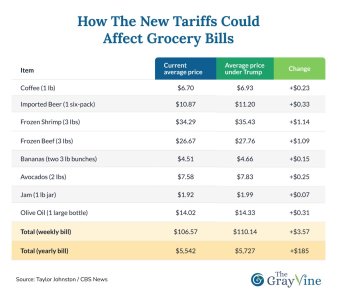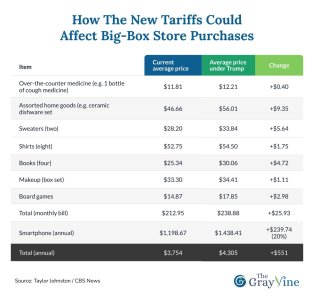Will these proposed tariffs strain your food budget? Here’s what we know
- Replies 1
Life’s already hard as it is, with many expenses being thrown at us as we age. As we continue to navigate the economic ripples of the past few years, it seems there's another wave on the horizon that could further swell the cost of living for Americans.
Being keen on financial planning and budgeting helps us brace for potential price surges at the grocery store. This is especially helpful as a new analysis suggests that President-elect Donald Trump's proposed tariffs could significantly impact the nation's food aisles.
Americans report that they continue to experience the lasting effects of the highest inflation in 40 years, especially when they buy their essentials at the grocery store. Prices remain more than 25% higher prior to the pandemic, and the analysis by Third Way, an economic program, paints a concerning future picture for our wallets.
Before the election, Trump already proposed a 10% tariff on all US imports, in addition to a blanket 30% tax on all imports and a 60% tariff on products from China.
This could reignite price hikes that we've not seen since the highest inflation rates in four decades hit us since manufacturers and retailers usually pass these costs on to consumers.
The study projects that a typical family's annual grocery budget could increase by almost $200 next year, a rise of more than 3%. "Prices are absolutely going to rise, because the added costs from increased tariffs will be paid by the consumer," said Gabe Horwitz, Senior Vice President at the Third Way.
For those who have carefully managed their retirement savings, this could mean re-evaluating budgets to accommodate higher costs. It's not just about the numbers; it's about the impact on the daily lives of Americans and the strain on financial security.
Although, Karoline Leavitt, Trump’s spokesperson and soon-to-be White House Press secretary, disputed this claim by saying, “In his first term, President Trump instituted tariffs against China that created jobs, spurred investment and resulted in no inflation. President Trump will work quickly to fix and restore an economy that puts American workers by re-shoring American jobs, lowering inflation, raising real wages, lowering taxes, cutting regulations and unshackling American energy.”
Despite this, adjunct assistance of international trade law at USC, Brian Peck mentions that Trump’s plans on any new tariffs remains unclear. "If he doesn't like a certain practice or policy initiative, he can use it as leverage to threaten them."
Tariffs are often considered a regressive form of taxation. This means they disproportionately affect those with lower incomes, who spend a larger portion of their budgets on essentials like groceries.
The Third Way study took a practical approach, estimating the impact on a weekly grocery list that includes items like coffee, beer, shrimp, beef, bananas, avocados, jam, and olive oil.
While these may not be staples for every household, they represent goods that the US heavily relies on imports for. The analysis suggests that Trump's tariffs could lead to an additional $3.57 spent on these groceries each week, totaling an extra $185 per year.

The ripple effect of these tariffs would likely extend beyond the grocery store. Big-box retailers such as Walmart and Target could also see price increases, particularly for goods imported from China. This could mean an additional $551 per year for families shopping at these stores, with spending projected to rise 14%.
One US company has already shared their response to Trump’s proposal. Steve Madden, a popular shoe brand, mentioned that it “imports fewer goods made in China to the US, and replaces them with items made in other countries.”
"If you take Trump at his word, the sheer cost of tariffs for low-income families is astronomical," Horwitz stated.

It's important to note that imposing steep tariffs can have broader economic consequences.
They can invite retaliatory levies on US exports, leading to a tit-for-tat situation that can escalate tensions and disrupt global trade.
Oxford Economics forecasts that if Trump's administration imposes the proposed tariffs, China would likely respond with its own tariffs on US exports, excluding electronic products.
"Tariffs are a two-way street, and the more aggressive tariffs on China will lead to a larger retaliation," reported Ryan Sweet, Chief US Economist at Oxford Economics. "We assume China will impose 25% tariffs on all U.S. exports, though with exemptions for electronic products."

Have you already noticed an increase in your grocery bills? What strategies are you considering to manage your budget? Share your thoughts about this story in the comments below!
Being keen on financial planning and budgeting helps us brace for potential price surges at the grocery store. This is especially helpful as a new analysis suggests that President-elect Donald Trump's proposed tariffs could significantly impact the nation's food aisles.
Americans report that they continue to experience the lasting effects of the highest inflation in 40 years, especially when they buy their essentials at the grocery store. Prices remain more than 25% higher prior to the pandemic, and the analysis by Third Way, an economic program, paints a concerning future picture for our wallets.
Before the election, Trump already proposed a 10% tariff on all US imports, in addition to a blanket 30% tax on all imports and a 60% tariff on products from China.
This could reignite price hikes that we've not seen since the highest inflation rates in four decades hit us since manufacturers and retailers usually pass these costs on to consumers.
The study projects that a typical family's annual grocery budget could increase by almost $200 next year, a rise of more than 3%. "Prices are absolutely going to rise, because the added costs from increased tariffs will be paid by the consumer," said Gabe Horwitz, Senior Vice President at the Third Way.
For those who have carefully managed their retirement savings, this could mean re-evaluating budgets to accommodate higher costs. It's not just about the numbers; it's about the impact on the daily lives of Americans and the strain on financial security.
Although, Karoline Leavitt, Trump’s spokesperson and soon-to-be White House Press secretary, disputed this claim by saying, “In his first term, President Trump instituted tariffs against China that created jobs, spurred investment and resulted in no inflation. President Trump will work quickly to fix and restore an economy that puts American workers by re-shoring American jobs, lowering inflation, raising real wages, lowering taxes, cutting regulations and unshackling American energy.”
Despite this, adjunct assistance of international trade law at USC, Brian Peck mentions that Trump’s plans on any new tariffs remains unclear. "If he doesn't like a certain practice or policy initiative, he can use it as leverage to threaten them."
Tariffs are often considered a regressive form of taxation. This means they disproportionately affect those with lower incomes, who spend a larger portion of their budgets on essentials like groceries.
The Third Way study took a practical approach, estimating the impact on a weekly grocery list that includes items like coffee, beer, shrimp, beef, bananas, avocados, jam, and olive oil.
While these may not be staples for every household, they represent goods that the US heavily relies on imports for. The analysis suggests that Trump's tariffs could lead to an additional $3.57 spent on these groceries each week, totaling an extra $185 per year.

Prices for eight usual grocery items are projected to shoot up by 15%. Source: Taylor Johnston via CBS News.
The ripple effect of these tariffs would likely extend beyond the grocery store. Big-box retailers such as Walmart and Target could also see price increases, particularly for goods imported from China. This could mean an additional $551 per year for families shopping at these stores, with spending projected to rise 14%.
One US company has already shared their response to Trump’s proposal. Steve Madden, a popular shoe brand, mentioned that it “imports fewer goods made in China to the US, and replaces them with items made in other countries.”
"If you take Trump at his word, the sheer cost of tariffs for low-income families is astronomical," Horwitz stated.

Prices for another set of grocery items are projected also to heighten by 15%. Source: Taylor Johnston via CBS News.
It's important to note that imposing steep tariffs can have broader economic consequences.
They can invite retaliatory levies on US exports, leading to a tit-for-tat situation that can escalate tensions and disrupt global trade.
Oxford Economics forecasts that if Trump's administration imposes the proposed tariffs, China would likely respond with its own tariffs on US exports, excluding electronic products.
"Tariffs are a two-way street, and the more aggressive tariffs on China will lead to a larger retaliation," reported Ryan Sweet, Chief US Economist at Oxford Economics. "We assume China will impose 25% tariffs on all U.S. exports, though with exemptions for electronic products."
Key Takeaways
- Americans have experienced significant grocery price increases, 26% higher than pre-pandemic levels.
- President-elect Donald Trump's proposed tariffs may further elevate grocery prices, potentially straining family budgets.
- An analysis by Third Way suggests such tariffs could increase a typical family's annual grocery spending by nearly $200 or more than 3%.
- Imposing new tariffs could invite retaliatory measures from other countries, potentially harming U.S. exports and leading to further economic consequences.
Have you already noticed an increase in your grocery bills? What strategies are you considering to manage your budget? Share your thoughts about this story in the comments below!







